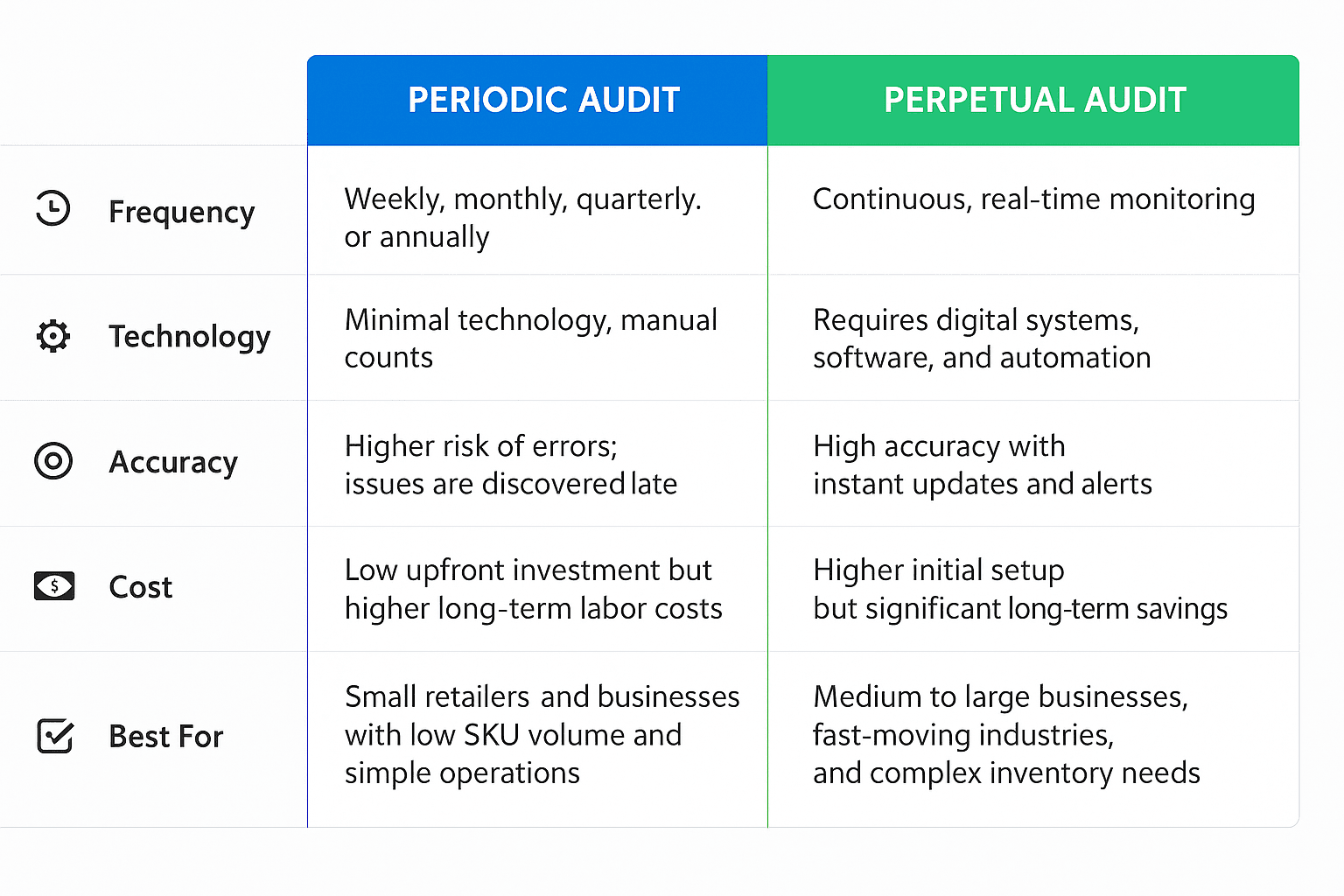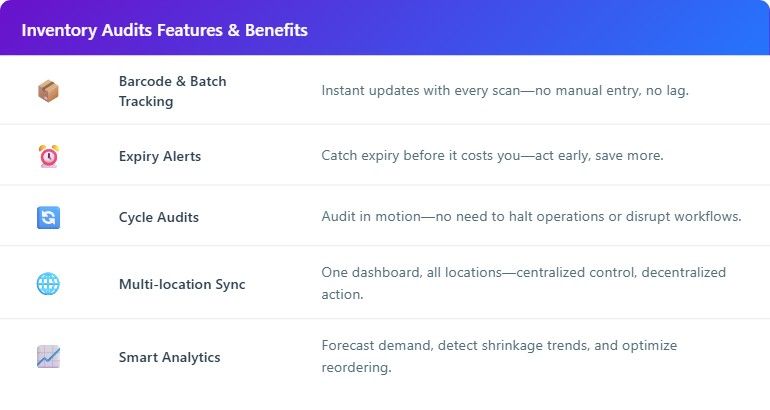Inventory Audit Guide: Periodic vs Perpetual, Smart Comparison
September 2, 2025 | By Stockount

Inventory auditing is like the health checkup of your business. Without it, you wouldn’t know what’s missing, wasted, or overstocked. Whether you run a small retail store or a multi-location supermarket chain, keeping an eye on your stock is critical to cutting costs, boosting profits, and keeping customers happy. But here’s the big question: should you go with periodic inventory auditing or adopt a perpetual system?
But here’s the big question: should you stick with periodic inventory audits or shift to a perpetual system? Let’s dive deep into both methods and see which one truly fits your business.
What is Inventory Auditing and Why Is It Crucial?
The methodical confirmation of stock levels to guarantee accuracy in financial reporting and operational performance is known as inventory auditing. Regular auditing helps businesses:
Identify discrepancies between recorded and physical stock.
Detect theft, spoilage, and mismanagement.
Forecast demand more accurately.
Prevent overstocking or stockouts.
Improve profitability through better control.
Understanding Inventory Auditing Systems
What is Periodic Inventory Auditing?
Periodic inventory auditing is the traditional, manual approach. Physical stock counts are conducted by businesses on a weekly, monthly, quarterly, or annual basis. You only know your actual stock levels after each audit, which means discrepancies may go unnoticed for long periods.
While periodic audits are simple and cost-effective, they come with drawbacks—delayed error detection, potential shrinkage, and inaccurate financial reporting in between audits.
Use Cases for Periodic Inventory Audits
1. Small Grocery Stores
Small neighborhood stores benefit from periodic audits (weekly or monthly) to track stock levels, prevent stockouts, and avoid overstocking. This approach ensures accurate financial reporting and minimizes operational costs without the need for a complex inventory system.
2. Seasonal Businesses
Businesses like holiday décor shops or seasonal outlets conduct periodic audits before and after peak seasons. This helps optimize stock levels, prevent shortages during busy periods, and minimize excess inventory after peak sales.
3. Specialty Boutiques
High-value stores, such as jewelry shops or luxury boutiques, rely on periodic audits to detect discrepancies, reduce theft, and protect valuable inventory. Regular audits enhance security and ensure accurate stock records, without the need for real-time tracking systems.
What is Perpetual Inventory Auditing?
Perpetual inventory auditing is a modern, tech-driven method that keeps track of stock in real time. With every sale, purchase, or return, inventory data updates instantly, thanks to barcodes, RFID tags, or integrated POS systems.
This approach offers complete visibility at all times, allowing businesses to make proactive decisions, reduce losses, and maintain tighter control over inventory.
Use Cases for Perpetual Inventory Audits
1. Multi-Location Retail Chains
Large retail chains require perpetual inventory audits to synchronize stock data across all stores in real time. These audits help avoid stockouts, manage surplus inventory, and ensure a smooth supply chain flow. The ability to track inventory across multiple locations enhances decision-making and improves profitability.
2. Perishable Goods Businesses
Pharmacies, liquor distributors, and fresh food suppliers rely on perpetual inventory audits to track expiration dates and monitor stock movement continuously. This real-time system helps reduce wastage, ensure regulatory compliance, and maintain customer trust by guaranteeing fresh and safe products.
3. Wholesale and Distribution Centers
Businesses handling large-scale operations with thousands of SKUs across multiple warehouses depend on perpetual inventory audits for accurate stock management. Real-time tracking allows seamless order fulfillment, reduces discrepancies, and supports predictive demand planning, essential for maximizing efficiency in high-volume industries.
Periodic vs. Perpetual: A Side-by-Side Comparison

Real-World Tale: Two Stores, Two Outcomes
Imagine this:
Store A – The "Wait and See" Method (Round Audit) Quarterly inventory counts are carried out by a nearby grocery store. At the end of Q2, they uncover $15,000 in losses , expired goods, unnoticed theft, and overstocked items. By the time they react, the damage has been done. It’s like checking the smoke alarm after the fire.
Store B – The “Always-On” Approach (Perpetual Audit with Stockount) A liquor distributor uses Stockount’s real-time audit system. Expiry alerts flag soon-to-expire stock, and shrinkage drops by 60%. Managers adjust purchasing on the fly, avoiding waste and maximizing shelf value. It’s like having headlights in a fog, clear visibility, confident decisions.
The difference? Delayed discovery vs. proactive control. Guesswork vs. data-backed precision.
Why Businesses Choose Stockount for Smarter Auditing
Stockount transforms perpetual auditing from a tedious chore into a strategic advantage, combining automation, mobility, and razor-sharp accuracy.
Audit Features That Drive Results

Businesses using Stockount report:
- Up to 70% reduction in audit time
- Over 40% decrease in losses from expiry and shrinkage
Periodic vs. Perpetual: Which Inventory System Fits Your Business?
Choose Periodic Inventory If:
- You run a small shop with a limited number of products.
- Budget limitations make it difficult to invest in technology.
- Your inventory turnover is slow, and periodic counts are sufficient for maintaining control.
Choose Perpetual Inventory If:
- You manage a medium-to-large retail, wholesale, or distribution operation.
- Your business handles perishable, fast-moving, or high-value stock where accuracy is crucial.
- Real-time tracking and up-to-date reporting directly impact profitability and decision-making.
Bottom line: Periodic inventory is a cost-effective choice for smaller businesses with low stock movement, while perpetual inventory offers the accuracy, efficiency, and control needed for scaling businesses where every unit and every minute counts.
Final Thoughts
Inventory audits aren’t optional, they’re survival tools. While Periodic audits offer simplicity, they leave businesses vulnerable to delayed errors and losses. Perpetual audits, especially with Stockount’s inventory audit software, provide real-time visibility, reduced shrinkage, and smarter decision-making.
In today’s competitive market, businesses that embrace perpetual auditing with Stockount stay ahead, saving money, time, and stress. Ready to make your audits smarter? Start your Stockount free trial now to enjoy continuous accuracy.
Your Guide to Periodic and Perpetual Auditing: FAQs
1. What’s the biggest drawback of periodic inventory auditing?
It only gives you a snapshot at intervals, leaving room for errors and missed opportunities.
2. Is perpetual auditing too costly for small businesses?
Not anymore. Affordable cloud-based tools make it accessible even for SMEs.
3. Can you combine periodic and perpetual auditing?
Yes, many businesses use perpetual systems for daily tracking and periodic audits for verification.
4. Which industries benefit most from perpetual auditing?
Supermarkets, e-commerce, pharma, and any business handling thousands of SKUs.
5. Does perpetual auditing eliminate shrinkage completely?
Not entirely, but it reduces it significantly by catching issues in real time.